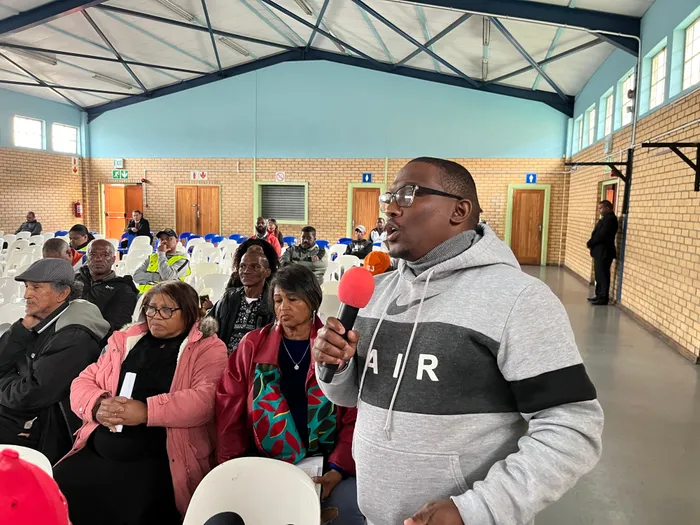Mitchell’s Plain speak to acting public protector

At the meeting on Thursday April 20 at the Mitchell’s Plain Indoor Sport and Recreation Centre in Portland child and youth care worker, Ashwin Johnson, said schools and teachers are under tremendous pressure.

Issues surrounding education and pressure on teachers were brought to light in a meeting with residents and the acting public protector of South Africa.
The acting public protector, Advocate Kholeka Gcaleka, met with the residents on Thursday April 20 at the Mitchell’s Plain Indoor Sport and Recreation Centre in Portland, to have a conversation with them on the issues affecting Mitchell’s Plain.

Child and youth care worker, Ashwin Johnson, said schools and teachers are under tremendous pressure and teachers may not be trained to fight social economic issues.
He said the Department of Social Development fails to understand they need more of their workers in the school system.
“Our civic centres should be accessed by the community but the City of Cape Town has failed to appoint play leaders,” he said, making reference to the City’s Come and Play unit, which had various recreational programmes in the community. “There have not been appointments made. Our school has one social worker and they never come out. By the time they get there our children are already on the streets,” said Mr Johnson.
“When you walk into affluent schools you will see the multi-disciplinary system of staff. All the teacher has to do is focus on the curriculum. Education and Social Development need to join hands to address our children and vulnerable families,” he said.
Bayview resident Elizabeth Fester said teachers are in crisis. “Social Development has services that could assist children who don't want to be in the system. There were skills development programmes for young people. This should return. We’re also affected by crime arising in our area.”
Debra Bailey, a sector head for the Mitchell’s Plain United Residents’ Association (MURA), said parents apply for a place in schools but the majority of pupils aren’t accepted and have to lodge an appeal. “Mitchell’s Plain is overcrowded,” she said.
“We’ve engaged with the community and heard their complaints. We look into whether the government is delivering services to ensure that there is equality through equity. We must be active participants in society. We must speak to one another and take responsibility to be activists in our communities,” said Ms Gcaleka.
Bronagh Hammond, spokesperson for the Western Cape Education Department (WCED) said the department is working with Social Development and other government organisations with programmes for pupils to address behavioural issues in schools. The behaviour of a pupil often affects the mental wellness of their teachers.
A provincial inter-departmental task team on well-being has been established under the leadership of Department of Health. The WCED is represented on the team, she said.
The Department of Social Development did not respond to the Plainsman’s queries in time of print.
Advocate Deon Barnard, the Public Protector SA’s executive manager for provincial investigation and integration, reminded the residents to follow the route of filing complaints so that they can follow up. “We can’t do anything if we don’t have it in writing. If you have evidence to substantiate your complaints, we will be able to assist as well,” he said.
Ms Gcaleka said they will come back, consult and gather more information on these issues they’re able to follow up on. “Once it falls within our mandate then we can investigate,” she said.
She noted that the youth were not present to raise issues affecting them. They must be the ones educating their peers and take active charge in that, she said.
Some of the other issues that arose were crime, police services, health services and service delivery.
Michael Jacobs, deputy chairperson of Mura, said Mitchell’s Plain was created for a certain community.
“We’re at a disadvantage. Service delivery is getting people mad in Mitchell’s Plain. We have a problem with people standing outside facilities as they cannot cope with the demands. The City needs to plan with a sufficient budget to assist. We can’t blame things on theft and vandalism but the budget should be there,” he said.
He hopes this won’t be the last engagement from the public protector’s office as he wants to unpack more of the challenges Mitchell’s Plain face, he said.
Chairperson of the Cape Flats Safety Forum, Abie Isaacs, said they need to have a community-centred approach.

“We have a crisis with murder, as we are dealing with urban terror. We need justice and service delivery. Dockets aren’t prepared enough when it comes to court cases, this needs to be dealt with between SAPS and the National Prosecuting Authority (NPA),” he said.
Chairperson of the Ward 116 ANC branch, Juli-Ann McConney, said the community is outnumbered by gangsterism and drugs. “We really need more feet on the ground and more assistance with the social ills we face,” she said.
Mura member Linda Jones said seniors are being left behind. “It is sad, seniors have to stand in long lines, especially with the SA Social Security Agency (SASSA) services. The post office service is not running. Our people are stranded and have to travel far if they don’t get assistance. They must be dealt with immediately,” she said.
“Government needs to put plans in place to deal with these issues immediately. We need to deal with the systemic issues. I commend the community for standing up here today and will be remembered for being brave to shed light on these issues,” said Ms Gcaleka.
Ms Hammond said the WCED has an Employee Health and Wellness Programme (EHWP) in place for all its employees. The service provides professional support for various issues, including family challenges, financial advice, relationships, medical advice, and work-related challenges.
Employees could contact the EHWP on their toll-free number, 0800 111 011 to have a confidential conversation with one of their counsellors who will provide counselling support.